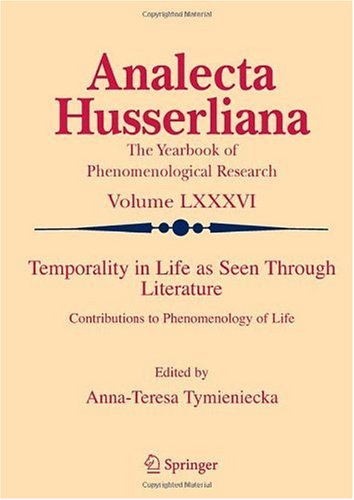

Most ebook files are in PDF format, so you can easily read them using various software such as Foxit Reader or directly on the Google Chrome browser.
Some ebook files are released by publishers in other formats such as .awz, .mobi, .epub, .fb2, etc. You may need to install specific software to read these formats on mobile/PC, such as Calibre.
Please read the tutorial at this link: https://ebookbell.com/faq
We offer FREE conversion to the popular formats you request; however, this may take some time. Therefore, right after payment, please email us, and we will try to provide the service as quickly as possible.
For some exceptional file formats or broken links (if any), please refrain from opening any disputes. Instead, email us first, and we will try to assist within a maximum of 6 hours.
EbookBell Team

4.8
54 reviews
ISBN 13: 9781402053306
Author: AnnaTeresa Tymieniecka
Temporality pervades all the dynamic joint of existence, and the human being as such. As human beings unfold through ontopoiesis, each move of which punctuates the temporality of life, they, whose life experience, deliberation, planning, reflection and dreaming are permeated by temporal motivations and concerns, feel that they are engaged in the spinning of a common thread. Attributing to that involvement universal laws, constant existential validity and power, they absolutise/hypostasise its rule as a cosmic/human factor: “time”. Yet today technologies are transforming the temporality of our existence by accelerating, intensifying, expanding our partaking in the world of life. Human communal and social involvement is being challenged in its personal significance to the core of our being. What happens to “time”? A basic reinvestigation of the nature of temporality is called for. Human creative endeavor – especially literature – may initiate it. Having the human subject – the creator – at its center, literature is essentially engaged in temporality whether that of the mind or of the world of life through the creative process of writing, stage directing, or the reader’s and viewer’s reception. Out of the cross-motivations that the creative mind filters in its temporal synthesis in touch with all the perspectives of existence, there surges the deepest significance of life in humanity and culture. But, first of all, life comes to light as timing itself in its logos.(Tymieniecka) Papers by: A-T. Tymieniecka, A. Ashvo-Munoz, A. Omrani, R. Gray, T.E. Afejuku, M.-Q. Ma, W.S. Smith, J.S. Smith, V. Kocay, I. Okhamafe, P. Mroz, T. Despotovic, M. Dion, R.M. Painter, V.G. Rivas, W. O’Brien, J. Kim-Reuter, A. Zacharz, L. Kimmel, J. Handerek, M. Durante, V. Reed, M. Statkiewicz, D. Doyle, J. Collins, L. Livesay, R.J. Wilson III.
Front Matter
Section I – Front Matter
A Temporal Chora
Literature and the Sense of the Past
“A Moment in Timelessness”: Ben Okri’s Astonishing the Gods
A Mode of Recollection in African Autobiography
“In an Instant of Time”: The Imagist Perception and Phenomenology in Ezra Pound’s Cantos
Ascent Patterns in the Early Poetry of Tennyson
Section II – Front Matter
Ontology and Epistemology of Time in the Stage Play
Temporal Sequence and Permanence in Neiges by Saint-John Perse
Non-Teleological Temporality in Philosophy and Literature
The Conflicting World-Views of the Traditional and the Modernist Novel
Towards the Infinite Memory
Time-Memory and Duration-Moment: Proust and Woolf in Dialogue
Section III – Front Matter
Temporal Rearrangement of the Moral Cosmos: Alice Munro’s Fiction
On Tragedy and Pathos in Henry James’s The Beast in the Jungle
Telling Time: Literature, Temporality and Trauma
Transcendence Unbound: Existence and Temporality in Montaigne’s Essays
what is temporality in literature
what is the human experience in literature
temporality of life
temporality definition in literature
temporality in literature
a temporary matter literary analysis